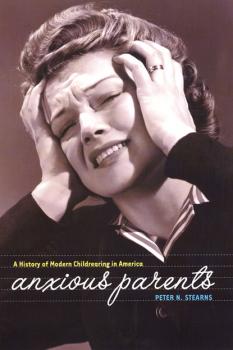ТОП просматриваемых книг сайта:















Peter N. Stearns
Список книг автора Peter N. StearnsАннотация
In recent years, Peter N. Stearns has established himself as the foremost historian of American emotional life. In books on anger, jealousy, «coolness,» and body image, he has mapped out the basic terrain of the American psyche. Now Stearns crowns his work of the past decade with this powerful volume, in which he reveals the fundamental dichotomy at the heart of the national character: a self-indulgent hedonism and the famed American informality on the one hand, and a deeply imbedded repressiveness on the other. Whether hunting and gathering tribe or complex industrial civilization, every social group is governed by explicit and implicit guidelines on how to behave. But these definitions vary widely. The Japanese worry less about public drunkenness than Americans. Northern Europeans adhere to stricter standards than Americans when it comes to littering. Today, we swear more now and spit less, discuss sex more and death less. With an emphasis on sex, culture, and discipline of the body, Stearns traces how particular anxieties take root, and how they express inherent tension in contemporary standards and a stubborn nostalgia for the previous nineteenth century regime. Battleground of Desire explodes common wisdom about Americans in the twentieth century as normless and tolerant, emphasizing that most of us follow a litany of rules, governing everything from adultery to bad breath.
Аннотация
The nineteenth and twentieth centuries saw a dramatic shift in the role of children in American society and families. No longer necessary for labor, children became economic liabilities and twentieth-century parents exhibited a new level of anxiety concerning the welfare of their children and their own ability to parent effectively. What caused this shift in the ways parenting and childhood were experienced and perceived? Why, at a time of relative ease and prosperity, do parents continue to grapple with uncertainty and with unreasonable expectations of both themselves and their children? Peter N. Stearns explains this phenomenon by examining the new issues the twentieth century brought to bear on families. Surveying popular media, *#8220;expert” childrearing manuals, and newspapers and journals published throughout the century, Stearns shows how schooling, physical and emotional vulnerability, and the rise in influence of commercialism became primary concerns for parents. The result, Stearns shows, is that contemporary parents have come to believe that they are participating in a culture of neglect and diminishing standards. Anxious Parents: A Modern History of Childrearing in America shows the reasons for this belief through an historic examination of modern parenting.
Аннотация
Cool. The concept has distinctly American qualities and it permeates almost every aspect of contemporary American culture. From Kool cigarettes and the Peanuts cartoon's Joe Cool to West Side Story (Keep cool, boy.) and urban slang (Be cool. Chill out.), the idea of cool, in its many manifestations, has seized a central place in our vocabulary. Where did this preoccupation with cool come from? How was Victorian culture, seemingly so ensconced, replaced with the current emotional status quo? From whence came American Cool? These are the questions Peter Stearns seeks to answer in this timely and engaging volume. American Cool focuses extensively on the transition decades, from the erosion of Victorianism in the 1920s to the solidification of a cool culture in the 1960s. Beyond describing the characteristics of the new directions and how they altered or amended earlier standards, the book seeks to explain why the change occured. It then assesses some of the outcomes and longer-range consequences of this transformation.
Аннотация
In the twentieth and twenty-first centuries, modern urban, industrial, affluent societies have made great strides towards fixing some of the problems that plagued other societies for centuries: food shortages are nearly eliminated, infant and maternal mortality has fallen dramatically, birth control is both readily available and effective, education levels are higher, and internal violence is significantly reduced. Modernity’s blessings are many and bountiful—but has modernity really made us happy? Satisfaction Not Guaranteed is a book about the modern condition, and why the gains of living in modern urban, industrial, affluent societies have not proved more satisfying than they have. It examines why real results that paralleled earlier anticipations of progress have not generated the ease and contentment that the same forecasters assumed would apply to modern life. Employing his trademark inquiry of emotions in American history, Peter N. Stearns asks why, if modern life has been generally characterized by measurable themes of progress, abundance, and improvement, are people not happier or more content with their lot in life? Why is there an increased incidence of psychological depression, anxiety, and the sense that no one has ever reached a pinnacle of happiness or contentment? It’s not so much that modernity went wrong, but rather that it has not gone as swimmingly as was anticipated. Satisfaction Not Guaranteed uses concrete examples from both history and the present, such as happiness surveys, to discuss how as a society we might better juggle the demands of modern life with the pursuit of happiness.
Аннотация
The modern struggle against fat cuts deeply and pervasively into American culture. Dieting, weight consciousness, and widespread hostility toward obesity form one of the fundamental themes of modern life. Fat History explores the meaning of fat in contemporary Western society and illustrates how progressive changes, such as growth in consumer culture, increasing equality for women, and the refocusing of women's sexual and maternal roles have influenced today's obsession with fat. Brought up-to-date with a new preface and filled with narrative anecdotes, Fat History explores fat's transformation from a symbol of health and well-being to a sign of moral, psychological, and physical disorder.





